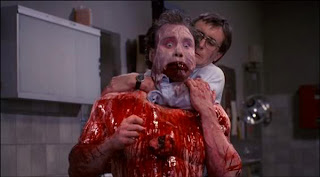In
Warm Bodies, the world is 8 years into a zombie apocalypse. R, a young
guy who can't remember his past before becoming a zombie, falls in love
with Julie who's part of a group of survivors that he attacked with a
group of zombies. He brings her back to the airport where he "lives" to
keep her safe and spending time with her starts a change in him that
restores his humanity. When she runs away from him after learning he was
the one who ate her ex boyfriend he learns from his friend that the
other zombies are changing too. He decides he has to see her again and
explain that all the zombies are becoming human again before the
impending attack from the skeleton zombies happens. He risks his life to
find her in the survivor base and does so again when he confronts her
father, the leader of the survivors, in order to protect her and the
changing zombies from the skeleton zombies.
In
this situation a utilitarian would agree with R's choice to
endanger himself. As utilitarianism states, one should act to benefit
the whole of conscious life and this "requires self-sacrifice,
especially for those able to substantially impact" others
("Self-Interest" 1393). By telling Julie about the changing zombies and
confronting her father he was able to defend the lives of all the
zombies from the incoming survivor troops. This benefited the zombies
but also the survivors because it gave them hope of a cure and in the
end they work together and kill off all the skeleton zombies and reclaim
the city. His sacrifice saves everyone in the city from the zombie
apocalypse, human and corpse alike. This makes his decision justifiable to a utilitarian.
A Kantian would also agree with his decision because R made the choice that helped him reclaim his humanity. His decision also upheld his duty to help his zombie friends and to protect Julie from the skeletons. To empirically test his decision's permissibility a Kantian must look at Categorical Imperative which is tested with the Formula of Universal Law and the Formula of Humanity. These rules state that an action must be rational if it was willed by everyone and that humanity is treated as an end and not a means to an end ("Kantian Business Ethics" 7, 9). This follows the Formula of Universal Law because it is rational to expect that everyone in R's situation could make the choice to risk their lives to provide this information. It follows the Formula of Humanity because protecting his own humanity and that of the rest of the zombies are valuable results of his actions. A Kantian would strongly support R's actions because it upheld his duties and is found permissible by two of the formulas of Categorical Imperative.
Sources:
Salazar, Heather. “Self-Interest,” The New Catholic Encyclopedia, Series on Ethics and Morality, ed. by Robert Fastiggi. Gale Cengage Learning, 2013
Salazar, Heather. “Kantian Business Ethics,” in Business in Ethical Focus, ed. Fritz Allhoff and Anand J. Vaidya. Broadview Press, 2008
Picture Sources:
http://www.jaredmobarak.com/2013/02/01/warm-bodies/
| Julie's father prepared to shoot R. |
A Kantian would also agree with his decision because R made the choice that helped him reclaim his humanity. His decision also upheld his duty to help his zombie friends and to protect Julie from the skeletons. To empirically test his decision's permissibility a Kantian must look at Categorical Imperative which is tested with the Formula of Universal Law and the Formula of Humanity. These rules state that an action must be rational if it was willed by everyone and that humanity is treated as an end and not a means to an end ("Kantian Business Ethics" 7, 9). This follows the Formula of Universal Law because it is rational to expect that everyone in R's situation could make the choice to risk their lives to provide this information. It follows the Formula of Humanity because protecting his own humanity and that of the rest of the zombies are valuable results of his actions. A Kantian would strongly support R's actions because it upheld his duties and is found permissible by two of the formulas of Categorical Imperative.
Sources:
Salazar, Heather. “Self-Interest,” The New Catholic Encyclopedia, Series on Ethics and Morality, ed. by Robert Fastiggi. Gale Cengage Learning, 2013
Salazar, Heather. “Kantian Business Ethics,” in Business in Ethical Focus, ed. Fritz Allhoff and Anand J. Vaidya. Broadview Press, 2008
Picture Sources:
http://www.jaredmobarak.com/2013/02/01/warm-bodies/













